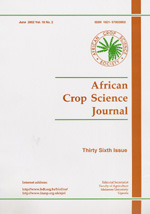
|
African Crop Science Journal
African Crop Science Society
ISSN: 1021-9730
EISSN: 1021-9730
Vol. 6, No. 1, 1998, pp. 79-95
|
 Bioline Code: cs98009
Bioline Code: cs98009
Full paper language: English
Document type: Research Article
Document available free of charge
|
|
|
African Crop Science Journal, Vol. 6, No. 1, 1998, pp. 79-95
| en |
Gender and generation: an intra-household analysis on access to resources in southern Mali
De Groote, Hugo & Coulibaly, N'Golo
Abstract
This paper analyses the differences of access to productive resources
within the household of southern Mali. Information was collected through
separate group discussions with older men, younger men, and women from six
villages. This information was complemented with a formal survey of 96
households in 12 villages. It was found that the essential differences
between individuals related to access are gender, age, marriage and being
the head of the household. The head of the household, always a man, manages
the common fields, but otherwise men have less access than women to private
plots and to the gathering of forest products. They have, however, more
access to animals, and own all equipment. Differences between ethnic groups
are very important. Methodologically, an effort has been made to reduce age
into categories of generation and relation to the head of the household,
but generally these variables did not perform very well. For future
intra-household surveys following strata need to be distinguished for
sampling: heads of household, dependent men and women. Other influential
variables to be included in the survey are age, ethnic group, marriage and
participation in field work.
Keywords
access, gender, intra-household resource allocation, Mali, resources
|
| |
| fr |
De Groote, Hugo & Coulibaly, N'Golo
Résumé
Ce document analyse les differences en acces aux ressources productives au
sein de l'exploitation familiale au Mali-Sud. Les informations ont ete
collectees a travers des discussions informelles avec des vieux, des jeunes
et des femmes de six villages. Ces informations ont ete completees par une
enquete formelle de 96 exploitations familiales dans 12 villages. Il
ressort que les differences essentielles entre individus sur le plan acces
aux ressources sont le genre, l'age, le mariage, le faite d'etre chef de
l'exploitation, et le groupe ethnique. Le chef d'exploitation, toujours un
homme, gere les champs familiaux, mais d'une facon generale, les hommes ont
moins d'acces aux champs personels et a la cueuillette des produits
forestiers que les femmes. Ils ont cependant plus d'acces aux animaux et
possedent tous les equipements. Les differences entre les groupes ethniques
sont tres importantes. Du point de vue methodologie, un effort a ete fait
pour reduire la variable ege en categores de generation et de relation avec
le chef d'exploitation, mais la performance de ces variables etait faible.
Pour les futures enquetes intra-menage, on retient comme groupes de
sondages chefs d'exploitation, autres hommes et femmes, avec variables
supplementaires ege, ethnie, mariage, et les participation aux travaux
communs.
Mots Clés
acces, genre, allocation des ressources, intra-menage, Mali, ressources
|
| |
© Copyright 1998 - African Crop Science Society
|
|
